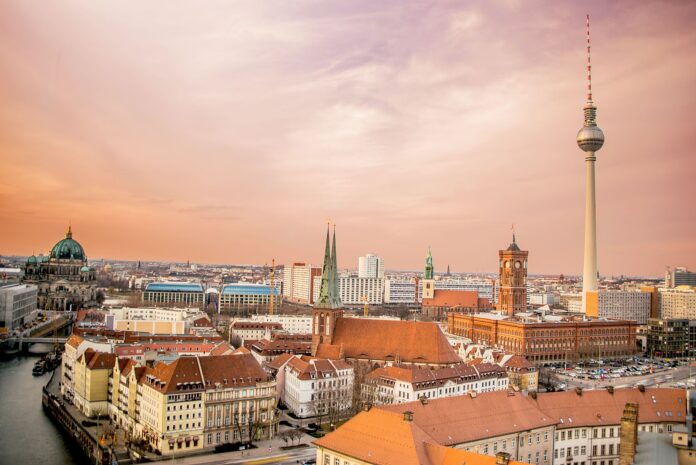Norway’s ambition to be a global chief on local weather change is at odds with its standing as one of many world’s largest oil and fuel exporters.
In 2019, the nation was fifteenth on the checklist of the world’s prime oil-producing nations, in line with provisional knowledge from the Worldwide Vitality Company, and ranked eighth on the planet for pure fuel manufacturing, behind Australia however forward of Saudi Arabia.
The majority of income from Norway’s oil and fuel manufacturing is stored in a sovereign wealth fund, which was created to maintain the cash for the Norwegian individuals and future generations. The fund, which has amassed $1 trillion since its inception within the Nineties, is a supply of stability for the nation in instances of financial instability, just like the coronavirus pandemic.
In December, Norway’s Supreme Court docket dominated towards environmental activists who sued the federal government as a result of they felt oil-licensing permits granted within the Arctic threatened their proper to a clear surroundings beneath the nation’s structure. The choice will now pave the best way for extra drilling within the Arctic.
Consultants seek advice from this as Norway’s “paradox”: Norway desires to be on the forefront of worldwide efforts to handle local weather change, but it continues to depend on closely polluting fossil gasoline extraction for continued financial prosperity.
To get a greater sense of this paradox and the way Norway would possibly have the ability to lastly escape of it, I spoke with Bård Lahn, a researcher at Norway’s Heart for Worldwide Local weather Analysis (CICERO) in Oslo. Lahn is an skilled on the nation’s oil coverage and the way Norway is attempting to align its ambitions on local weather change with its position as a big oil and fuel producer.
Our dialog, edited for readability and size, is under.
Jariel Arvin
Let’s begin in the beginning: When was oil found in Norway, and what was the financial system like on the time?
Bård Lahn
The primary main oil discovery was made the day earlier than Christmas Eve in 1969. From the early Nineteen Seventies, Norway began to develop its oil and fuel manufacturing. On the time, the Norwegian financial system was just about in the identical place as its different Nordic neighbors and far of Western Europe. I feel that’s an vital level: Norway actually wasn’t a poor society previous to discovering oil.
Jariel Arvin
However the discovery of oil did find yourself making the nation far wealthier, proper? How did that occur?
Bård Lahn
In the event you return and skim the coverage paperwork on the time oil was found, it’s stunning how aware politicians have been to guarantee that the cash from oil went to society as a complete.
There was a whole lot of concern that nations with massive oil industries — like the US — would sweep in and take all of the earnings in another country, so there have been numerous insurance policies put in place to make sure the advantages of oil manufacturing would keep in Norway.
Jariel Arvin
And what concerning the sovereign wealth fund?
Bård Lahn
For the reason that mid-Nineties, the sovereign wealth fund has captured the entire income that involves the state from oil and fuel manufacturing. It’s at present the most important sovereign wealth fund on the planet, price over a trillion {dollars}. Divide that by a inhabitants of roughly 5 million, and you may see that every technology has appreciable wealth by the fund.
The entire thought of the fund is that it’s not going to be spent. It’s a means of saving the income for the longer term in order that what’s being spent is all the time simply the returns.
Jariel Arvin
How does the wealth fund influence on a regular basis Norwegian society?
Bård Lahn
The cash always being transferred into the financial system has given Norwegian politicians a whole lot of room to extend spending with out having to make some robust budgeting choices which are a actuality in different nations. There’s definitely an consciousness that Norway has financial savings and some huge cash to present us consolation throughout troubling instances.
Take the pandemic, for instance. We all the time know that now we have this cash out there that can be utilized to melt the blow.
Jariel Arvin
Okay, so clearly the oil-driven wealth fund is vitally vital to Norway, each economically and politically. However on the identical time, the nation desires to be a preeminent participant in fixing local weather change. How can Norway proceed to rely so closely on oil and fuel extraction and declare to be an environmentally progressive nation?
Bård Lahn
Ever since local weather change has gained significance, there was broad political settlement in Norway that the nation ought to deal with the issue. However on the identical time, we’re nonetheless one of many largest fossil-fuel exporters on the planet — we’re exacerbating the issue we wish to resolve.
In Norwegian politics, there’s been a really profitable try to separate the dialogue of oil coverage from the dialogue of local weather coverage. The 2 have been by no means actually tightly linked [in the country] till roughly the final decade, and this division has grow to be more and more tough to keep up.
Jariel Arvin
Would you say that Norway has been deliberately dishonest by separating its oil coverage from its local weather coverage?
Bård Lahn
I wouldn’t say “dishonest,” as a result of the individuals who helped design this manner of separating local weather coverage and oil coverage have been truly satisfied that they have been doing the suitable factor.
Norwegian politicians additionally haven’t been alone in creating the situations that made this division attainable. They’ve been helped immensely by the worldwide local weather regime. Take the Kyoto Protocol, for instance, which very clearly locations the accountability for greenhouse gases on the nation the place fossil fuels are consumed, and never the nation the place they’re produced.
From the very starting of worldwide local weather coverage, there was this settlement that nations needed to account for the emissions that they create once they burn fossil fuels. All of the accountability was positioned on the demand aspect, not the provision aspect, which was very handy for Norway.
Jariel Arvin
The place does Norway’s oil go? Have there been any important research on the environmental influence of its oil manufacturing overseas?
Bård Lahn
Europe is the first marketplace for Norway’s oil and fuel. However figuring out the local weather results of Norwegian manufacturing shouldn’t be easy. One examine has estimated a transparent local weather profit from lowering oil output, however the market is complicated and the end result actually relies on your assumptions about how different actors will behave and the way the market will evolve over time.
Bård Arvin
What’s the consumption of power like in Norway in comparison with different nations?
Bård Lahn
The large irony right here is that Norway is a pretty big fossil-fuel producer, however we use comparatively few fossil fuels straight in our power use. Practically all of our electrical energy has for a very long time come from hydropower. In most years, we even export numerous renewable electrical energy to our neighbors.
The one place the place fossil fuels are used to straight produce power is to run the platforms offshore. They use fuel to run the generators to get the power wanted for oil and fuel manufacturing.
Jariel Arvin
I noticed a latest report that Norway’s authorities is elevating carbon taxes on its oil sector. Is {that a} means for the federal government to power the business to make up for its air pollution?
Bård Lahn
The federal government’s new local weather plan, which was unveiled just some days in the past, does embrace plenty of new and extra aggressive measures to scale back Norway’s home emissions. The proposal to extend the already fairly excessive CO2 tax on offshore emissions got here as one thing of a shock, and it’s more likely to go even whether it is at present being challenged by the business.
Nevertheless, it is very important understand that this proposal solely targets the production-related emissions of Norwegian oil, not the extent of oil that’s being extracted and exported. As such, it’s according to the historic separation between local weather and oil policymaking, which tends to focus solely on emissions taking place inside Norway and exclude any concern for the local weather influence of exported oil and fuel.
Jariel Arvin
So, backside line: Can Norway truly be a climate-change chief whereas this paradox nonetheless exists?
Bård Lahn
The Norwegian paradox has labored out pretty nicely up till the previous couple of years as a result of there was little deal with the manufacturing of fossil fuels, and since Norway is sufficiently small to keep away from the scrutiny that some bigger nations face. However that is rapidly altering, each within the home and worldwide political dialogue.
There may be now much more deal with the provision aspect of fossil fuels than 10 years in the past, with a number of nations like Denmark asserting an finish to drilling and new analysis exhibiting a mismatch between deliberate fossil-fuel manufacturing and concepts corresponding to a “non-proliferation treaty” for fossil fuels being floated. The treaty would convey the world collectively in agreeing to finish using fossil fuels very like the UN got here collectively to curb the unfold of nuclear weapons.
This can make it more and more onerous for Norway to carry on to a management declare so long as oil manufacturing retains being expanded into new areas.
Jariel Arvin
What’s almost definitely to get Norway to finish its oil and fuel manufacturing? Financial issues? Worldwide local weather issues? Political stress?
Bård Lahn
Financial issues are more likely to be decisive, which is why a lot of the nationwide political debate about the way forward for oil is exactly concerning the financial aspect: How dangerous will it’s to guess on new oil extraction in doubtlessly high-cost areas such because the Arctic if local weather coverage reduces demand and retains costs low?
However political stress and a priority with Norway’s worldwide fame might play a task, too, particularly in figuring out how far politicians are more likely to go to maintain oil exercise artificially excessive. The excessive variety of jobs within the sector offers the business a whole lot of political leverage — which we noticed not too long ago throughout the pandemic-fueled worth drop final 12 months.
The oil firms received an enormous victory in Parliament, with very favorable tax situations in an effort to keep away from job losses and diminished funding. Any such political energy play would possibly very nicely grow to be extra frequent if the business continues to say no, and in that state of affairs, worldwide stress and local weather issues might play a task in counteracting business foyer energy.
Jariel Arvin
Do you suppose the nation will ever withstand its historical past and the fact of what its oil and fuel manufacturing has already carried out to the surroundings?
Bård Lahn
I’m certain this might be a hotly contested a part of Norway’s oil historical past for many years to return. There’s a very sturdy established narrative of Norwegian “exceptionalism” within the oil sector — that due to our sturdy social-democratic system we have been capable of management the oil business, avoiding the “useful resource curse” [the paradox of resource-rich countries often doing less well economically than countries with few natural resources] and making certain that the nation’s oil wealth benefited all of society.
There may be a lot reality on this. However the environmental aspect of the story is more and more difficult the established historic narrative and even our nationwide id, and we already see that it is a supply of stress within the nationwide debate about oil and local weather coverage.



.jpg)



/cloudfront-us-east-1.images.arcpublishing.com/mco/ZDVFC6GYEVAFXKYUAF3TQ2TR4E.jpg)